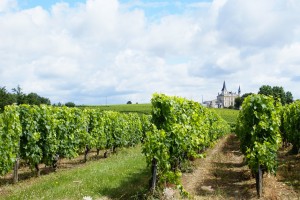Organic Winegrowing
Organic Vineyards
 The wines we sell always meet our quality expectations from scratch: they are grown naturally, hence, free of any chemical or artificial fertilizers. The implemental use of green manures, compost or the application of mineral fertilizers, won from rock flour, are allowed. The vineyards are usually greened and mulched. The wine growers dispense with chemical herbicides, insecticides and fungicides altogether.
The wines we sell always meet our quality expectations from scratch: they are grown naturally, hence, free of any chemical or artificial fertilizers. The implemental use of green manures, compost or the application of mineral fertilizers, won from rock flour, are allowed. The vineyards are usually greened and mulched. The wine growers dispense with chemical herbicides, insecticides and fungicides altogether.
Vine pests are controlled organically by the application of biocides, which stimulate the development of natural enemies, or by the fortification of the vine’s resistibility. The loss of earnings caused by this kind of cultivation is accepted consciously for the sake of quality.
 The soil cultivation and plant care is processed considerably with the aim of a long-term preservation of the soil fertility. The natural monoculture of the vines is supposed to be integrated into the vineyards eco-system.
The soil cultivation and plant care is processed considerably with the aim of a long-term preservation of the soil fertility. The natural monoculture of the vines is supposed to be integrated into the vineyards eco-system.
Organic growth of wine is regulated by EU laws. Therefore, producers and retailers are controlled on a regular basis. In addition, many of the growers are member in winegrower’s associations such as Ecovin or Demeter, which apply a further set of own principles (e.g. Ecovin Standards).
Organic Wines in the Cellar
Again – the procedures differ from those used in conventional viniculture. During storage and filtration processes, producers have to spare chemical aids. The amount of sulfur, which is indispensable for the production of storable wines, is reduced to at least 1/3 below the licit maximum, mostly much lower. If necessary, wines are fined by bentonite (a clay mineral) or protein and filtered with asbestos-free material. The production of high-quality wines requires a gentle finishing. Yet, the quality of wines is determined by the vineyard, and a proficient and conscious oenologist will be able to maintain this quality within the vault and finally transport it into the bottle.
Organic Wines and the Community
Soils, groundwater and air are not contaminated with pesticides or nitrate. Ecologically cultivated vineyards are a nutritious biosphere for many plant- and animal species. They prevent slopes from erosion, improve groundwater formation and constitute an enrichment for the cultural environment.
Organic Wine Consumption
There is no assurance that biologically grown and processed wines are entirely free from residues, due to common environmental concerns. However, organic wines contain a minimum of synthetic pollutants and pesticides, which leads to a measurably increased quality of the wines. Lower harvests and the conservative way of growing the grapes leads to variety-specific and characteristic wines. This, in turn can be considered a further advantage.
Our Choice and Principles
We exclusively sell wines from producers we know and whose quality we value. Wines of anonymous origin are not accepted. Personal contact to growers is of utmost importance to us. Only by this practice we are able to ensure a close cooperation and exchange of experience, which leads to long-term business relationships and enhances positive outcomes.